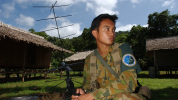Search
Using the filters to the left, click your selection, it will become bold and filter the results, click it again to remove that filter.
Major Power Competition Jason Begley of the Air Power Development Centre offers a nuanced appreciation of Competitive Strategies in the Indo-Pacific , published through the Harvard Belfer Centre. This report is an extended read (approx. 2 hours) that anchors appreciation off an approach that ‘views strategic competition structurally – poised atop a hierarchy made up of smaller competitions, which are themselves comprised of discrete, single-issue contexts.’ This analysis leverages the approach taken in the …

Deterrence The UK Chief of General Staff (CGS), General Sir Mark Carleton-Smith, spoke on 29 Sep about how the UK Army is prepared for the challenges of the future. The full speech is available here , with the following quote being of note: “It is the capability to war-fight which provides the credibility to underpin a form of flexible modern deterrence – ensuring resilience in defence and unpredictability in offence – and it is this capability that drives our competitors to operate in the shadows.” This …

Deterrence Vice Chairman of the Joint Chiefs of Staff, Air Force Gen. John Hyten recorded a presentation for the National Defence University about the ongoing relevance of deterrence. Gen Hyten spoke to deterrence as a component of the forthcoming U.S. Joint Warfighting Concept, which will be enabled by four underlying concepts: joint contested logistics, all-domain command and control, joint fires and information advantage. Major Power Competition Foreign Policy has analysed a Finland Ministry of Defence …

Reviewed by Major Andrew Maher By Alexander Watson, Penguin Random House, UK, 2019, ISBN 9780241309063, 246pp Australian audiences tend to associate the military challenges of the First World War with Gallipoli, Belgium and France but, a century on, a broader aperture is necessary. On the Eastern Front, the Habsberg army was meant to hold the Russians at bay, allowing the German army to shift its weight of effort to achieving decisive victory through the Schifflen Plan in the west, before rebalancing its …

Deterrence Dr Cathy Moloney of the Australian Defence College drew attention this week toward hypersonic weapons and how they might play a role in an Australian deterrence strategy. Dr Moloney argues that ‘the recent successful testing of Russian hypersonic missiles means that this is not an abstract conversation… but a real threat that would be… used as a coercive tool to change great power politics in our region.’ Major Power Competition A report by the Asymmetric Warfare Group (AWG), John Hopkins …

In my early days as a Trainee Army Officer, I often found myself wanting a better grasp of how all the elements and levels of warfare fitted together. The Joint Military Education and Training program at the Australian Defence Force Academy (ADFA) focused on strategy. Conversely, the concurrent Single Service Training periods at the Royal Military College, Duntroon (RMC), dealt almost exclusively with tactics. With a lack of military experience, I did not truly understand how tactical actions nested within …

This is part two of an adaptation of the author’s essay entitled Moral injury and the gap between the soldier and the state’s moral identity, which placed third in the ADF Officer’s category of the 2019 Jamie Cullens Defence Essay Competition. The original can be viewed in full on The Forge’s website here . Moral Injury Part One provided leading clinical definitions of Moral Injury, prior to framing it within the morality of a society and individuals’ moral identity. It also highlighted one of the ways in …

Nuclear Proliferation CSIS delivers ‘ Toward a More Proliferated World? ’, a comprehensive report identifying and assessing the geopolitical trends that may shape the future nuclear proliferation landscape. CSIS argues that the current US framework to prevent proliferation is being eroded by geopolitical forces; and raises questions whether the international community’s relatively successful non-proliferation track record can be maintained. CSIS highlights seven concerning trends: Nuclear threats are …

This blog post is a two-part adaptation of the author’s essay entitled Moral injury and the gap between the soldier and the state’s moral identity, which placed third in the ADF Officer’s category of the 2019 Jamie Cullens Defence Essay Competition. The original can be viewed in full on The Forge’s website here . While Post Traumatic Stress Disorder (PTSD) and Veteran Suicide receive a great deal of attention in Australia, the existence of moral injury is receiving growing attention. A/Prof Deane-Peter …

When responding to the strategic challenges in the Indo-Pacific, the Australian Defence Force (ADF) is employed as a tool of coercion and deterrence. In regional peacekeeping, for example, where the Australian Federal Police (AFP) is charged with maintaining order and controlling crime alongside the indigenous police forces, the ADF is used as an instrument of persuasion against the greater sources of violence and instability. Within this role, the ADF can be thought of as an ‘information operation’ (IO). …

